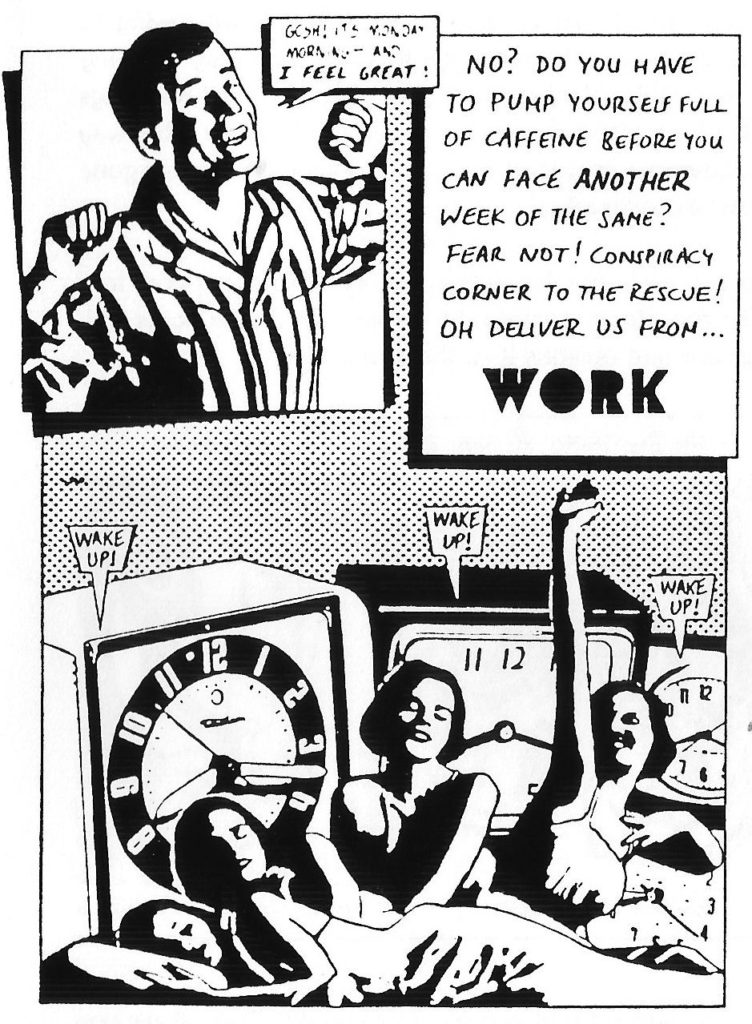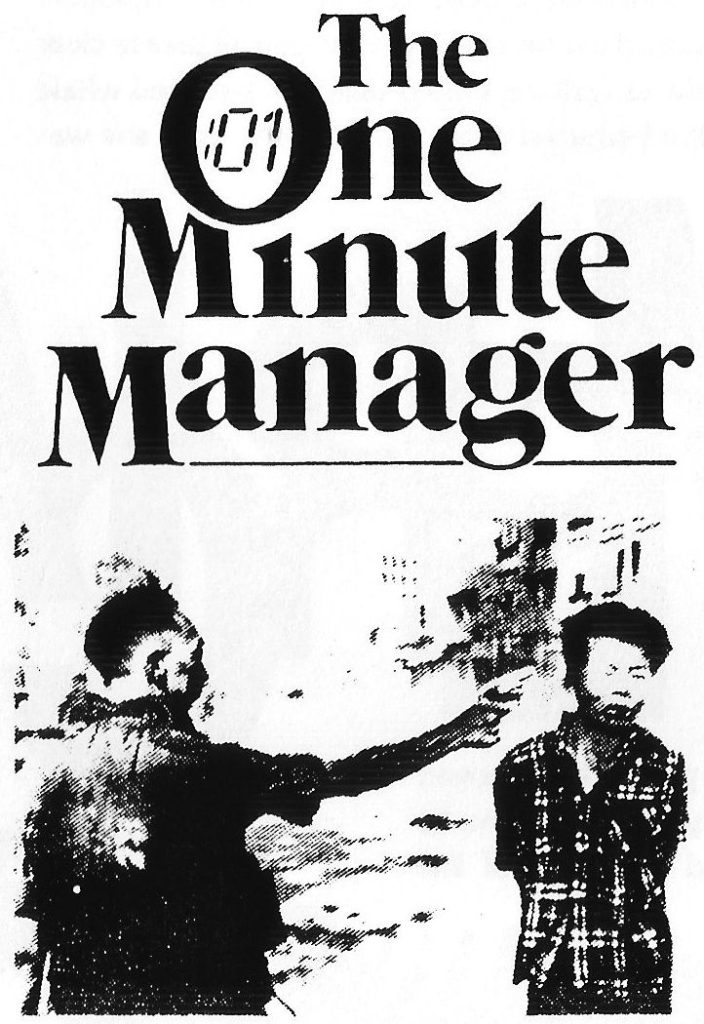Conspiracy Corner: Work
Certain unpleasant facts of life do occasionally have to be faced. Grim realities must sometimes be confronted. That knock on the door is not likely to be Phoebe and Winona popping round with a six-pack. The chances are slim that United Artists are going to lob $75 million in your direction to allow you to direct “The Railway Children 2: The Beeching Years”. And the odds are, you won’t be able to get through life without having to work.
However, you can minimise the impact that work has on your lifestyle, and reduce it to being merely something you do between weekends. Here’s a few I’ve found useful – though some examples relate to my personal experience, with imagination most of these can be converted to suit any job.

- Many people, disgruntled with their life between 9 and 5, think they can escape by changing jobs. This only makes things worse; it’s usually not the JOB that’s the problem, it’s WORK itself. The longer you stay in one place, the less you need to do, and people will eventually assume you have a divine right to spend your life photocopying.
- If your boss takes lunch from 1 till 2, take your lunch from 12.15 to 1.15 – this will allow you to extend your break by half an hour or so without much problem. Early shifts and late shifts are also good, in that there are usually fewer people around to see you not doing anything.
- The secret of minimising work through illness is, perhaps surprisingly, to come into work when you’re feeling most wretched. Take the first couple of days AFTERWARDS off instead. There’s no point in staying at home when you’re sick; you won’t enjoy it, and anyway, the working day really speeds by if you’re tanked up on cough mixture. It also adds credibility when you do bunk off – people will think “It must be REALLY bad if he isn’t coming in”. One exception to this rule is if you have a hangover: it’s hard enough to manage simple things (like breathing), without having to pretend to work as well. You’ll only get a reputation as a hard drinker if you’re obviously suffering (and it’s not easy to conceal!) so stay at home, pull the blankets over your head and wait for things to get better. If you’re having your wisdom teeth removed, say, get it done on a Monday – that way you can recuperate in company time and stagger in a couple of days later looking like you’ve gone 15 rounds with Jackie Chan, and winning instant sympathy.
- Have a long-term, ongoing task that you can pick up whenever someone’s watching you. In a shop, you can stack shelves. In an office, file reports. In a computer department, clear some disk space or check for viruses. The more impressive and obvious it is, the better.
- The ideal situation is to work for a boss who doesn’t understand what you do. This allows you to pull the wool over his eyes, nose, mouth and down to his belly-button. There’s no point in doing a job fast – they’ll just find something else for you to do. So, when asked for an estimate of how long something will take, pause, look at the ceiling for a while, then give double the actual time and move it up to the next unit. If queried, say something like “Well, I COULD xways cut a few corners”, while giving a look that implies “…but I’m not taking any responsibility if I do”. My personal best is getting five days to change one line of one computer program and with schedules like that, it doesn’t take much effort to come in right on time.

- Dubious activities are best concealed in flocks. The chances are slim of anyone spotting the letter you’re writing if it’s on a desk top covered with bits of paper, and a nuke-the-alien-slimeballs game can easily be overlooked if you have more flashing screens than your average multiplex. Be careful with this, however, as it can cramp your style: it’s easy for one screen to mysteriously short-circuit on a Friday afternoon, (especially if you drench it in coffee, with added salt for extra viciousness), less plausible for a deskful to simultaneously explode.
- Your job should resemble your leisure pursuits where possible. Want to write letters? Offer to do reports, invoices, memos, etc. This also means that you’ll get to use all sorts of nice word-processers, laser printers and other devices to make your letters/CV/’zine look cool. Want to chat on the phone to friends? Do so right after a legitimate and well-publicized call, but use discretion – intimate discussion of your sex life is likely to provoke comment, unless you work for Electric Blue.
- Cover for your colleagues and they’ll cover for you. It is not good karma to answer a workmate’s phone at 4.30pm with “she’s out to lunch” even if it’s true. However, there may be traitors with a warped sense of values who actually WANT to work. Drop them in it every opportunity – it’s useful to have a scape-goat and they tend to possess bizarre notions like “fair play” which will prevent them from retaliating.
- Become indispensable. Knowledge is not only power, it’s also a comfy chair. Try and avoid teaching your arcane wisdom to anyone else or writing it down – should either case becomes unavoidable, leave out small but important points, which will sink anyone trying to replace you. If pulled up on these, affect an air of injured innocence and claim the missing info was “obvious”.
- Perhaps most importantly, ALWAYS HAVE AN ESCAPE ROUTE. The truth should be used where possible – it makes the lies, when they come, that much more plausible. Similarly, be prepared to take the rap for little things as you’ll improve your chances of being believed when you deny the big cock-ups. Everything should be explicable, escapeable or at least blamable on someone else. Panic doesn’t help, a phrase like “Well, guess that’s my lunch-hour almost over” does.
Most jobs require very little in the way of direct competence to survive -all you need to do is avoid being marked as INcompetent. Remember this, and you’ll have a good chance of, if not quite ENJOYING work, at least being able to survive it.
